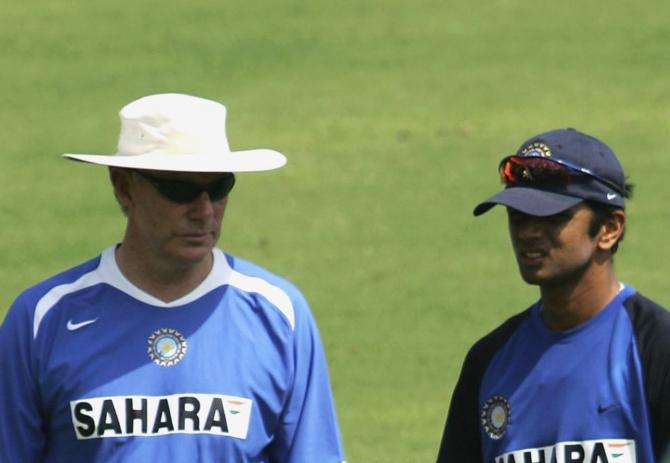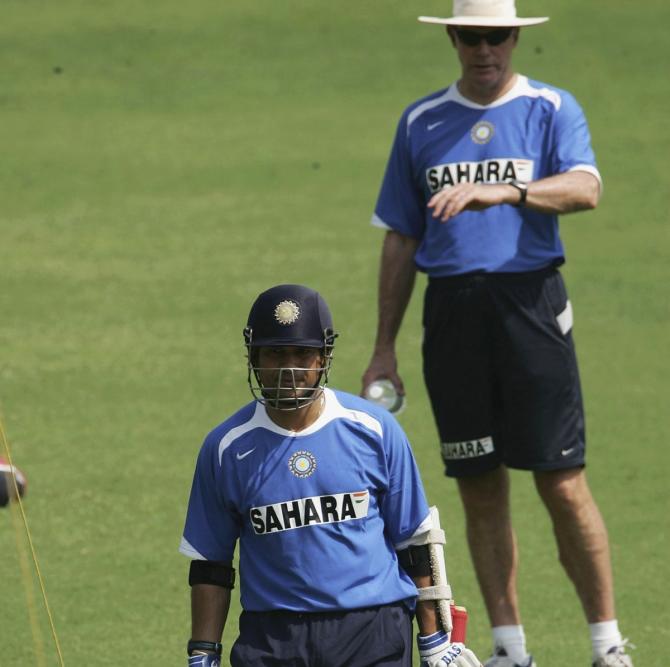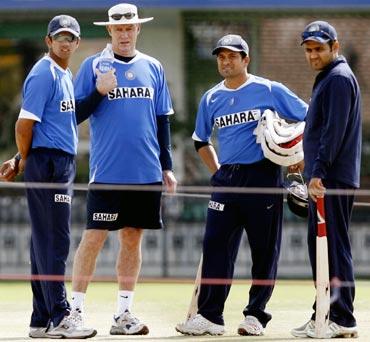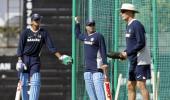The only way for Dravid to sort out the mess was by forcing a showdown and getting Chappell removed as coach.
That possibility was remote as Dravid neither had the ears of the BCCI nor was he the sort to confront knotty issues head on.
A fascinating excerpt from Pradeep Magazine's Not Just Cricket: A Reporter's Journey through Modern India.

On that Pakistan tour was Siddhartha Vaidyanathan (Sidvee), a young spirited, knowledgeable cricket writer from the Web site Cricinfo, who after the Test defeat was being briefed by the Indian coach.
In this off-the-record conversation (meaning whatever was said was not to be ascribed to the person) Greg was conveying to the reporter his assessment of what went wrong and what he thought needed to be done to raise a team that could be a strong contender for the 2007 World Cup.
To Sidvee's horror and shock, the coach was telling him that Tendulkar, Sehwag, Laxman were not good enough to be playing the 2007 World Cup and should be dropped and a new set of players groomed in their place.
Greg wanted Sidvee to do a story that would present this as the reporter's own assessment of the best way forward for India. This opinion would be expressed as Sidvee's without any reference to Greg.
Sidvee was on his first major cricketing assignment and was left too rattled to make any sense of this.
He immediately sought me out as a friend, and we had a lengthy discussion on what this meant for Indian cricket.
What was disquieting was not that Greg felt the way he did about the best Indian batsmen, but that he had sought out a reporter, one he did not even know well, to plant this idea in in the media.
Perhaps he had chosen Sidvee because he preferred the story to be on the Internet (Cricinfo is a Web site), or because he thought this young journalist would do his bidding.

If Greg could talk so openly to someone he did not even know personally, he surely must have been saying similar things to others as well.
Imagine Tendulkar and the others learning that their coach was criticising them behind their backs and that too to the media, and wanted them out of the team! We knew that such a thing would create havoc.
The young journalist and I both decided that it was our responsibility to prevent such an eventuality from taking place.
The first step would be to inform the Indian captain that the coach was making statements that could divide the team.
Sidvee did not want to be identified as the journalist in whom Greg had placed his 'trust' to do this story, but otherwise didn't mind the whole conversation to be conveyed to Dravid.
The urgency in my voice when I called him in his room made Dravid agree immediately to meet me.
I was a bit nervous as, much like my conversation with Ganguly in 2004, this too was about internal team bickering and I was the outsider telling tales.
I rushed into the details without much preamble, emphasising that if this got out, as was likely, it would create a rift that could spell trouble for him and his team.
I admitted that as a news reporter this was a sensational story, but as a well-wisher of the team I wouldn't want to publish it.
However, it was very important for him to know what his coach was up to.
Dravid appeared disturbed after hearing me out.
He asked me about the credibility of the journalist from whom I had heard the story.
Despite me trying to assure him that had the source not been trustworthy, I would not have been alarmed enough to contact him, Dravid did not look convinced.
He said that it was important for him to know the identity of that reporter.
I had no option but to convince Sidvee to identify himself even if he did not want to talk to the Indian captain directly.

The young journalist was new to the world of cricketing intrigues and worried that he may be in breach of 'professional ethics', but he eventually agreed.
Once Dravid realised it was Sidvee, whom he knew, had read and believed to be a well-meaning, honest person, the reality must have sunk in.
He appeared upset and like us did feel that this 'loose talk' should not go out in the public domain.
We did not know who else, apart from Sidvee, Greg had talked to, but on my own part I promised to keep quiet about it.
To his credit, Sidvee has since never even referred to what could have been a sensational scoop for him.
I don't know what went through Dravid's mind after he heard me and I had no clue what his relationship with Greg was.
As a captain his responsibilities and accountability had to be far greater than those of the coach, and to be worrying and dealing with the fall-out of his coach's indiscretions was the last thing he would have wanted.
It is always hard to get Dravid to talk about people and controversial issues.
On India's tour of the West Indies in 1997, when he was just a year into his international career, he had expressed his annoyance at journalists focusing on controversies rather than on cricket.
His views on this subject even now would probably not be any different.
Leading a cricket team means much more than marshalling your resources and displaying strategic acumen on the cricket field.
With captaincy comes a whole range of issues where the team leader has to be responsive to the needs and problems of his team-mates.
He has to take everyone's views on board, even those from people he may not like or understand.
All these concerns have to be dealt with extreme care and sensitivity for the sake of team harmony.
This is not an easy job, especially for someone who is happy to be left to himself.

Dravid understood the game's nuances and its technical aspects as well as anyone.
What he may have lacked was the patience and intent to go out of his way to establish a personal rapport with each of his players and assuage their fears and insecurities.
Unfortunately, he was saddled with a coach who was driving a wedge between his own players.
The Indian team needed a coach with a better understanding of how to keep a team united despite its diversity in terms of social background, religion and language.
What Dravid had to deal with, instead, was a person whom Tendulkar describes in his autobiography as the 'ringmaster', a man who only cared about his own opinions.
Greg had accused Ganguly of 'divide and rule', but this accusation could apply perfectly back to the coach himself.
The only way for Dravid to sort out the mess was by forcing a showdown and getting Chappell removed as coach.
That possibility was remote as Dravid neither had the ears of the BCCI nor was he the sort to confront knotty issues head on.
Dravid's choices were limited. He had to deal with what seemed a fait accompli.
This may have made him let things drift, which compounded the team's and his own problems.

I met Dravid one more time on that Pakistan tour, at the conclusion of the One-Day series which India had swept 4-1.
The resounding victory must have buoyed his spirits and he agreed to an interview with me.
Indeed, he appeared peppier and more confident when we met.
I did not dwell too much on the Greg issue, but Ganguly's omission was a topic that I wanted to explore.
His answer was interesting: 'If Anil Kumble can be dropped, India's greatest match winner, why can't anyone else?' He probably was referring to a period when Ganguly had preferred Harbhajan to Kumble in the XI.
Kumble had won more matches for India than anyone else, including Tendulkar.
Dravid was indirectly saying that if such a player could sit out, why was there so much fuss about dropping a batsman who was struggling with his form?
Throughout that thirty-minute interview, I sensed a feeling of unease underneath Dravid's cheerful demeanour.
Both of us knew that we were simply going around the more uncomfortable topic of the coach's actions without touching it, but it remained an issue the captain had to deal with.
Excerpted from Not Just Cricket: A Reporter's Journey through Modern India by Pradeep Magazine, with the kind permission of the publishers, HarperCollins Books India.
Feature Presentation: Rajesh Alva/Rediff.com












 © 2025
© 2025